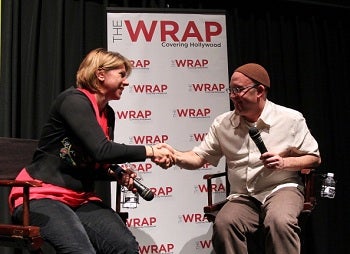Given the current tensions in the Middle East, the documentary "Follow Me: The Yoni Netanyahu Story" — which chronicles the life of Jonathan "Yoni" Yetanyahu, the Israeli army commander who led the 1976 raid on Entebbe, and who was the brother of current Israeli prime minister Benjamin Netanyahu — would seem to have particular relevance. But according to Jonathan Gruber, the film's writer and director, his film shouldn't be viewed through the prism of the region's current ailments.
 For one thing, Gruber told the audience at TheWrap's screening of the film Monday night at the Landmark Theatre in Los Angeles, work on the film began 16 years ago — long before the recent flare-up between Israel and Hamas in Gaza.
For one thing, Gruber told the audience at TheWrap's screening of the film Monday night at the Landmark Theatre in Los Angeles, work on the film began 16 years ago — long before the recent flare-up between Israel and Hamas in Gaza.
For another thing, Gruber added, injecting the film with politics would have gotten in the way of the real story.
"We wanted to keep the politics out of it, and focus on the story of one soldier's life," Gruber told TheWrap's editor-in-chief Sharon Waxman, who moderated a Q&A session following the screening of the film.
"More than half my family lives in Israel," Gruber later noted, but "as an American I feel strongly that i don't want to dabble in Israeli politics, it's not my place."
Instead, "Follow Me" chronicles the remarkable but brief life (the only Israeli fatality of the Entebbe raid, Netanyahu died at age 30), using interviews from his brothers, Benjamin and Iddo, as well as his wife Tuti and other family members. Fellow members of the elite Sarayet Matkal, who pulled off the raid that rescued nearly 100 Israeli and Jewish hijacking victims from their Palestinian terrorist captors at the Entebbe airport in Uganda, also fill in Netanyahu's biography.

Also factoring heavily into the movie's narrative: Letters that Netanyahu wrote to his family, which betray an eloquence and insight far beyond his years. (The missives were published in 2001 as part of "The Letters of Jonathan Netanyahu: The Commander of the Entebbe Rescue Force.")
Gruber (pictured at right) told Waxman and the audience that the letters, in particular, were a guiding force in directing the film.
"What struck me was reading these letters which came out after Yoni died," Gruber offered. "As I read this book, it was just remarkable how lyrical and poetic they were … I wanted to make sure the film captured the poetic and lyrical feel."
The resulting film offers a portrait of a conflicted man, one who was torn between defending Israel and pursuing academics (Netanyahu studied at Harvard), and whose devotion to the military played a significant role in his divorce from Tuti.
"It was important to show the flaws in his humanity," Gruber said during the Q&A session. "He's a conflicted character."
While Gruber was reluctant to draw comparisons between his film and the current difficulties in the Middle East, he did offer some differences between the era when Netanyahu stages his daring raid and the contemporary climate.
"The movie is] a portrait of a time in Israel that's in the past … in a way, it was about a time when things were simpler in terms of Israel and its relationship to its neighbors in the outside world," the filmmaker posited. "It was pretty clear that Israel was under attack … when I say simpler, I don't mean that it was a good time, but it was clear that Israel was protecting itself …. now there are a lot more complexities."

